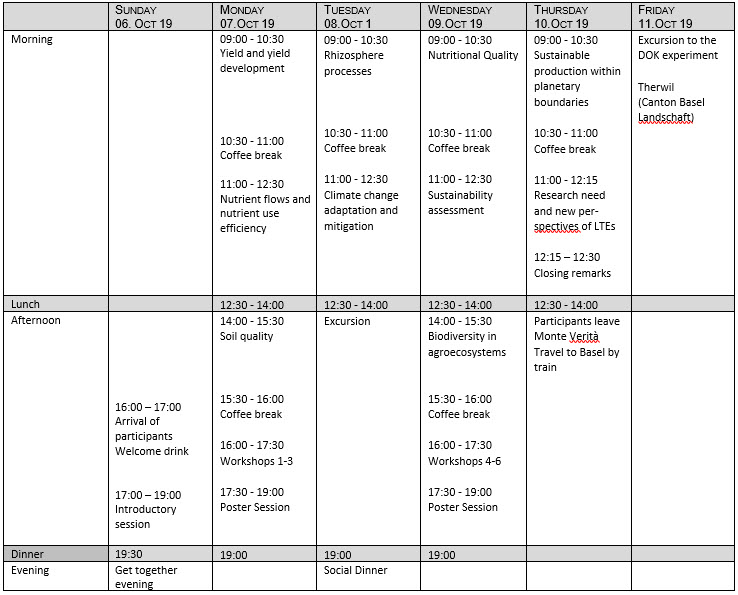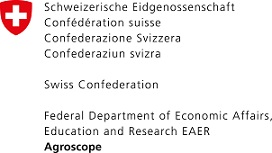Sunday, 06. October 2019
17:00 – 19:00: Introductory session
Welcome addresses
- Prof. Dr. Bernard Lehmann, former DG Swiss Federal Office for Agriculture (FOAM), Switzerland
- Dr. Eva Reinhard, Head of Agroscope, Switzerland
- Prof. Dr. Urs Niggli, Director of Research Institute of Organic Agriculture (FiBL), Switzerland
Keynote: Kate Scow, University of California, Davis, USA
Keynote: Paul Mäder, Research Institute of Organic Agriculture (FiBL), Switzerland
Monday, 07. October 2019
09:00 - 10:30: Yield and yield development
Keynote: Jochen Mayer, Agroscope, Switzerland
Sufficient and stable crop yields are the basis for feeding a growing world population. Limited cropland and upcoming challenges with climate warming raise future questions like: What are sufficient crop yields, how can crop yields be kept stable and how must future cropping systems be designed to allow a sustainable crop production? Long-term experiments give us valuable information on how crop yields perform in different cropping systems and how stable crop production is. The sessions focuses on what can be learned from long-term data series in the past for sustainable and probably more intensive cropping system in the future.
11:00 - 12:30: Nutrient flows and nutrient use efficiency
Keynote: Eric Steen Jensen, Swedish University of Agricultural Sciences, Sweden
Agricultural crop production requires huge amounts of fertilizers worldwide. Available nutrient resources like minable phosphorous deposits and fossil fuel to synthesize nitrogen are limited. Inputs of nutrients often exceed removals by crop products at field scale, especially in regions with high livestock density. This causes negative environmental impacts on ground and surface water, high greenhouse gas emissions or nutrient emissions exceeding critical loads for natural ecosystems. A better nutrient use efficiency is therefore one of the central goals for ecologically sound production. The session aims to highlight the present knowledge of nutrient flows in cropping systems, the use of nitrogen from legumes, organic and mineral fertilizers as well new concepts to better use nutrients by mobilization and recirculation within cropping systems.
14:00 - 15:30: Soil quality
Keynote: Else Bünemann, Research Institute of Organic Agriculture (FiBL), Switzerland
Soil quality is commonly defined as the capacity of a soil to function within ecosystem and land-use boundaries to sustain biological productivity, maintain environmental quality, and promote plant and animal (including human) health. Cropping systems affect biological, chemical and physical soil characteristics. This session will address such effects and integrate the findings in order to assess the long-term impact of agricultural productions on soil quality.
Tuesday , 08.October 2019
09:00 - 10:30: Rhizosphere processes
Keynote: Doris Vetterlein, Helmoltz Center for Environmental Research, Germany
Rhizosphere processes are pivotal for plant nutrition, but also for plant health and carbon allocation from assimilates into the soil. Root exudates and decaying root debris also contribute substantially to soil aggregation and are determinants for soil carbon accumulation. Mutual symbionts between the roots and microbes are gaining attention in view of optimised management, but also with respect to inoculation of beneficial microbes. The session aims at highlighting most recent developments of rhizosphere ecology in view of C, N, and P processes under different cropping systems.
11:00 - 12:30: Climate change
Keynote: Ana Iglesias, Universidad Politecnica de Madrid, Spain
Agricultural management practices have a district impact on climate. Soils are a substantial storage for carbon, but they also emit trace gases like N2O and CH4 and CO2 which accelerate climate change. Intensive fertilisation results in large N2O emissions, and soil organic matter is mineralised to CO2 after intensive tillage. Innovative farming practices like No-till organic farming, agroforestry and ley crop rotations can mitigate climate impact, but such systems may also be better adapted to climate change. Also the feeding of ruminants with roughage instead of grains in mixed farming systems can reduce emissions. In the session new research findings on adaptation and mitigation potentials of organic and conventional cropping systems will be shown, and strategies for improved systems are discussed, with a focus on the soil microbiota involved in nitrogen processes.
Wednesday, 09. October 2019
09:00 - 10:30: Nutritional Quality
Keynote: Carlo Leifert, Southern Cross University, Australia
There is increasing concern that the intensification of agricultural production can reduce the concentrations of nutritionally desirable compounds in the harvested products, and that residues of e.g., pesticides would further affect the nutritional quality. This session aims at comparing the nutritional quality of food cropped under organic and conventional systems, including identification of the systems components, which improve versus reduce quality.
11:00 - 12:30: Sustainability assessment
Keynote: Thomas Nemecek, Agroscope, Switzerland
Sustainable agricultural crop production is of paramount importance for the future agriculture. Life-Cycle Assessment methods as well as scientific modelling (SMART, RISE, STICS, etc.) can provide a comprehensive environmental-impact assessment and contribute to protect the climate and use limited resources such as energy, water, phosphorus, potassium and the soil efficiently. Further, they integrate economy and social matters. Outcomes can be used to improve management strategies. The session focuses on results from sustainability assessments based on long-term experiments and what addresses the question what can be learned from the results to improve future cropping systems.
14:00 - 15:30: Biodiversity in agroecosystems
Keynote: Henrik G. Smith, Lund University, Sweden
Worldwide biodiversity decreases in terrestrial ecosystems. A reduction in plant biodiversity due to intensive land use for agricultural production (e.g. habitat loss, monocropping, fertiliser or pesticide use) regularly involve a reduction of animal, insect or soil microbial diversity. Diverse agricultural system can provide several ecosystem services like climate regulation, water purification, pest and disease control or the preservation of genetic resources. The session focusses on questions on how biodiversity concepts can improve crop production and provide further ecosystem services, and which answers we get from long-term experiments.
Thursday, 10. October 2019
09:00 - 10:30: Sustainable production within planetary boundaries
Keynote: Hermann Lotze-Campen, Potsdam Institute for Climate Impact Research (PIK), Germany
Pressures on the Earth System induced by humanity have reached a scale where abrupt global environmental change can no longer be excluded. Planetary boundaries define the safe operating space for humanity if we want to be sure of avoiding major human-induced environmental change on a global scale. The definition of the boundaries is based on system characteristics that are considered stable during the last 10-20000 years and reflects the feedback mechanisms that may lead to a self-acceleration of environmental change.
What role play long-term experiments at local scales to allow for far-seeing views on global issues? Do they help to identify the boundaries that build the safe operating space for planetary systems? Can long-term experiments help to design future scenarios to feed the world before the breaking point?
11:00 – 12:15: Research need and new perspectives of long-term experiments
Keynote: Paolo Barberi, Sant’Anna School of Advanced Studies, Italy
Long-term field experiments are unique research platforms for studying the effects of cropping systems over decades. Research priorities may change, depending on the previous findings, and new topics due to emerging problems and societal demand. This session will contemplate on new perspectives of long-term experiments, and will address the potential and limitations of long-term experiments to answer global challenges.










